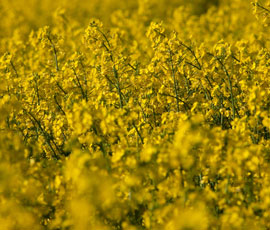Leaked EU proposal deals biofuel crops blow

EU proposals which favour new sources of biofuel feedstock such as used cooking oil could spell the end of biofuel crops and especially dual use crops such as oilseed rape and wheat, according to the NFU.
The proposals are circulating widely after having been leaked earlier this week. They require half of the renewable fuels needed to fulfil the EU’s Renewable Energy Directive to come from non-food sources.
Like straw and miscanthus, these sources would carry a much higher weighting in their contribution to fulfilling RED requirements than dual use crops such as wheat and oilseed rape.
Some of the measures proposed would take effect from 2017 and the weighting could potentially reduce the share of wheat and rape to nominal levels as biofuel feedstocks, said NFU combinable crops adviser James Mills, who specialises in non-food crops.
“The changes proposed are very damaging to the whole industry. They are very threatening,” said Mr Mills.
Grain consultant Richard Whitlock described the proposals as yet another U-turn, a terrible blow for investment confidence in the sector.
The proposals attempt to deal with greenhouse gas emissions associated with global changes in land use prompted by biofuel crop production, known as indirect land use change, or ILUC.
Implementation of the proposals could result in even greater price volatility and less security of feed ingredient supply for livestock producers, as well as intensifying rather than calming the fuel-crop versus food-crop debate, said Mr Mills.
The RED requires that 10% of fuel should come from renewable sources by 2020 and aims to ensure the use only of sustainable biofuels which offer greenhouse gas savings without having a negative impact on biodiversity and land use.
70% of the UK’s oilseed rape goes into biodiesel production while UK bioethanol plants are set to consume up to 2.5m tonnes of wheat annually once at full capacity. Biodiesel accounts for about 78% of EU biofuels and bioethanol about 20%.
“The cereals industry will become more extensive in their approach and focus on cost savings due to the increased volatility in the markets. This will be driven by the removal of the biofuel industry which provides a bottom line within global markets and allows for an element of security,” said Mr Mills.
“Removal of this security will lead to a decrease in investment in production and best practice.
“The collapse of the biofuel industry will increase our reliance on imported protein, of which we already have a 20m-tonne deficit in Europe. The biofuel industry was beginning to reduce this reliance due to the production of high protein co-products.
“Non-food crops such as miscanthus do not have the dual use that wheat or OSR do. At times where demand is there, they cannot be diverted from biofuel production into the food or feed markets.
“Essentially as the proposals stand they are an example of market management, something the EU should be trying to move away from.”
EU biofuel proposal aims:
- To start transition to biofuels delivering substantial greenhouse gas savings when estimated ILUC change emissions are taken into account.
- While protecting existing investments, to limit the contribution that conventional biofuels make towards attainment of the targets in the Renewable Energy Directiv
- To improve efficiency of biofuel production processes by raising greenhouse gas saving thresholds for new installations
- To greater market penetration of advanced (low-ILUC) biofuels by allowing these fuels to contribute more to targets in the RED than conventional biofuels
- To oblige Member States and fuel suppliers to report estimated indirect land-use change emissions of biofuels
- To provide market incentives for biofuels with low estimated indirect land-use change emissions
